You can find almost anything inside Kings Locksmith Inc, on Bedford Avenue off the corner of Dekalb in Bedford Stuyvesant, Brooklyn; at least that’s how it feels. There are used strollers, wooden cabinets, and cartons of hardware piled in a corner. Atop the pile, fluorescent lights are on sale for half price. On the other side of the space, brushes and screwdrivers hang closely to each other on the wall. Right below them are grey metal racks stuffed with gadgets, threaded pipes, electrical parts, light bulbs, letter stickers, filing every box and tray. But none of this interests David Bar. No, he’s headed straight to the counter, where he puts three rings of keys, eleven in total, on the black tabletop and says: “I need a copy of these keys.”
“One for each?” Rudy Martinez asks as he picks up the first set. He turns around quickly, comparing each with the ready-to-be-copied key models hanging on a wooden board pinned on the wall, and starts duplicating using the one of the four cutting machines underneath.
This is all fairly new. When Kings Locksmith first opened in 1988, it wasn’t focused on locksmithing. And people like David Bar who asked for copies in bunch didn’t show up until the past decade. Kings Locksmith was at first called Safeway Locksmith and Hardware, and it was essentially a hardware store that sold customized painting, plumbing, general electrical supplies, and other household products. The shift from products to key services was an attempt to adapt to and withstand the changes in the neighborhood, in particular competition from Home Depot, which opened in 2007 on Nostrand Avenue and Dekalb Avenue, just two blocks away from Kings Locksmith.
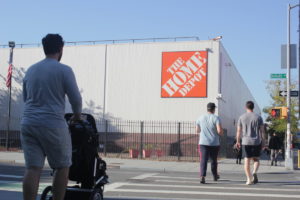
“When Home Depot opened 10 years ago, we lost a lot of business,” Randy Martinez, son of Rudy Martinez says, “But I realized that they don’t do locksmithing, so we decided to focus on that.” Kings Locksmiths now extends the key copying services to lockout, lock installation for real estate companies, electronic keys, and other lockout and installation services that Randy and the outside locksmiths he hired would go to the clients’ homes and apartments for.
It was a sensible decision to reinvent the shop and invest in the key services. The huge factory-style home improvement retailer beats them in capacity, product range, and price, but they can’t beat the Martinez’s loyal customer base and superb one-on-one services, which has enabled the shop to survive for nearly thirty years in Bed-Stuy.
Rudy Martinez is 68 years old, but his lean build and quick reflexes don’t show it. The smile lines on his tan cheeks make him look friendly all the time. The Martinez family moved into the building in the late 80s, the height of the crack epidemic, when Bed-Stuy wasn’t a great place to live in, according to Rudy Martinez. “I used to hear gun fire all night. In the morning I’d get up and sweep the bottles they had used for drugs.” Martinez remembers all this, as his eyes fixate at a distant point in his storefront. There were barely any salesmen back then, either. “People were afraid. It’s like an abandoned war zone. There were a lot of break-ins.” So when Martinez and his wife Ada opened up their business together in 1988, it was the only hardware shop in the area, and there was no competition.
Martinez and his wife Ada Martinez worked very hard, they would be “hustling around for seven days a week,” even on snow days when Martinez would get the salt. The shop used to sell “anything related to hardware and a little bit of everything,” according to Rudy. The goods were handpicked from Supermarket Hardware and the plumbing pipes were cut and threaded by themselves in the basement of the shop.
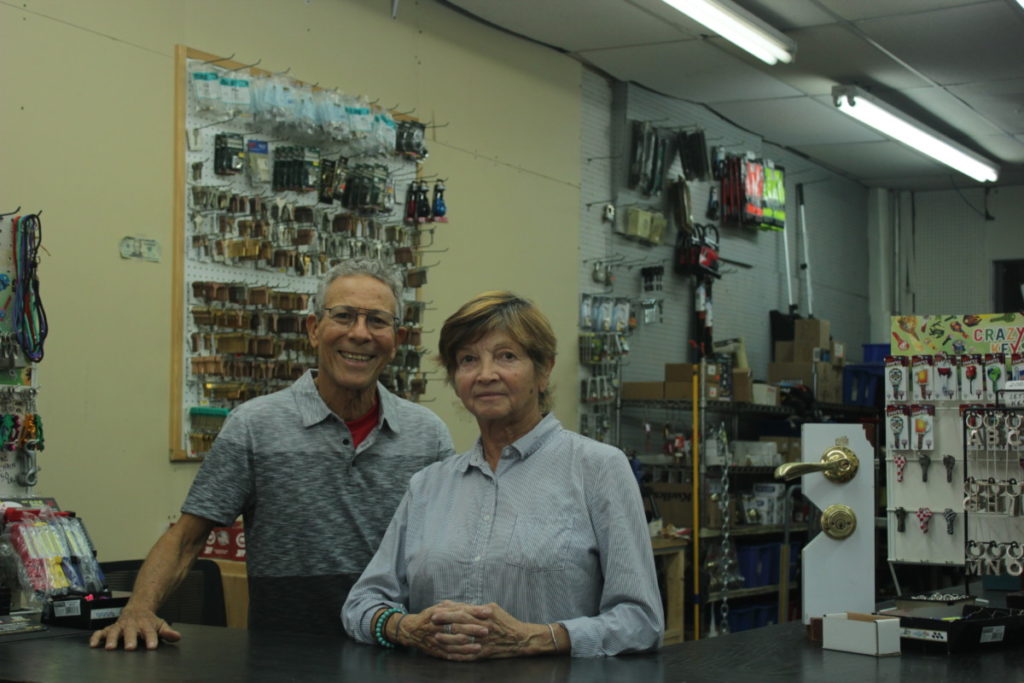
“It’s always packed. We had three employees.” Even though the neighborhood was tough, Rudy says, “We were doing quite well.”
But things changed in 2007, when Home Depot moved to Bed-Stuy. The capacity and variety that Home Depot is able to carry at low price soon outcompeted that of a local small construction like the Martinez’s hardware shop.
“We didn’t have a computer to do inventory. I’d go to Supermarket Hardware on the weekend and put everything into my cart. The wholesale inventories buy by the bulk, say 24, 36, …, I couldn’t. I’d get four of each and make the store look nice. If someone comes in and asks for something that we don’t have, I’d run out in my car and pick it up. The store has good vibes, the people recognize us, so we never had problems with drugs,” Martinez says as he recalls the old times.
“When people wanted to buy merchandise in large quantities, we can’t offer,” says Rudy Martinez’s wife, Ada.
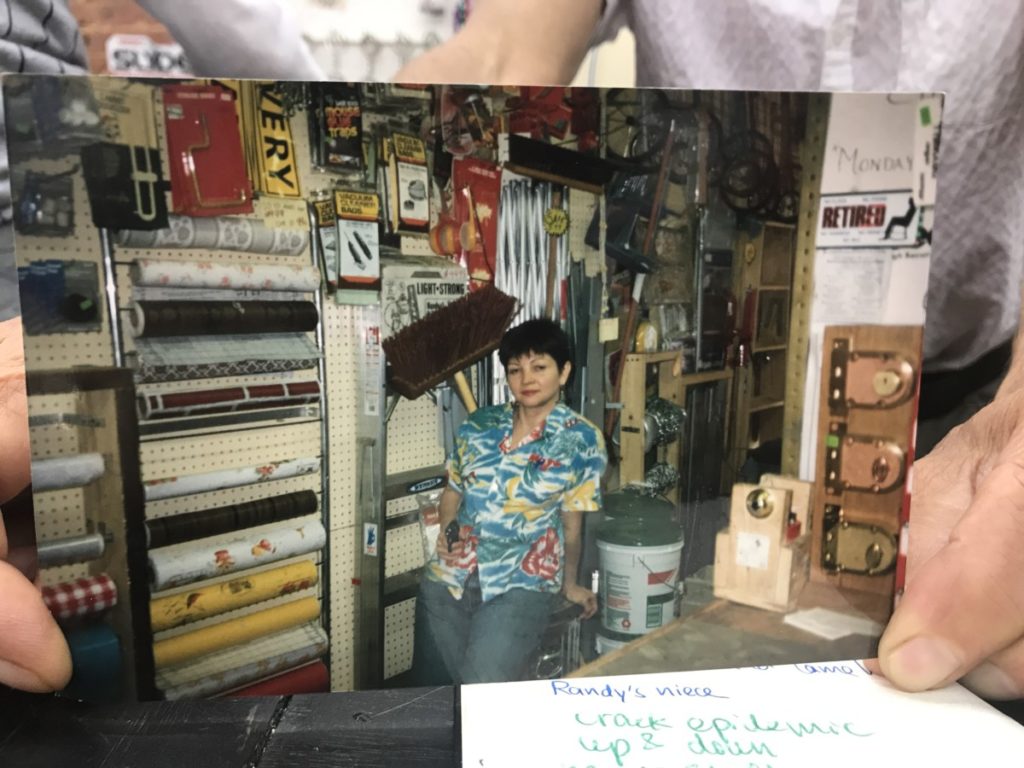
Little by little, the hardware the Martinez’s shop used to sell became obsolete. “These are all old school stuff,” Rudy Martinez says, as he rifles through the racks of boxes stocking gadgets, light bulbs, and stickers. That’s when I notice that how full the containers are and how far down some things are buried, the surface fixtures are covered in a thin layer of dust. “People don’t like old fluorescent lights these days. They prefer LED because it’s brighter. Those stuff we have left over; we put them on sale now.” Rudy Martinez eyes the fluorescent lights at the corner piled on top of the cartons.
And that’s when Rudy Martinez let his son Randy take the shop over. Randy realized that the only thing they could offer while Home Depot couldn’t, and still can’t, is “the service of locks,” as his father put it. Randy Martinez started to provide customers installation, lockout, some electronic keys that Home Depot doesn’t even sell, and all kinds of services related to locks.
“There are more bars. People get drunk and lose their keys. There are more doors, cars, and locks, so there are more needs,” Randy Martinez says. The locksmithing business was going so well, Randy hired outside locksmiths to help with the gigs, and eventually changed the shop’s name from Safeway Locksmith and Hardware to Kings Locksmith.
“New people moved in. Home Depot opened. There’s more need for [a] locksmith. When people have issues they can’t figure out, they will say ‘Go to your local smith.’ So it brings customers too.” Ada Martinez says Home Depot brought traffic to the neighborhood, which benefited them in a way.
The customers also changed, as well. Before the shop catered mainly to individuals living around the corner, but now they have established cooperations with real estate companies, like the one David Bar works for.
“They call it a gentrification or something. New buildings are built much higher than the old ones. Brownstones are usually only two to three stories. A lot of real estate companies moved in.” Rudy Martinez says those real estate people came with keys and they stored a set of keys at the locksmith shop. Whenever an agent comes to show people the apartments, they will need keys, and they can just come visit the locksmith shop to request Martinez make a new set. “They will just tell me apartment 1B, and we will make it for them. The boss can be in Puerto Rico,” Rudy Martinez says.
When asked who exactly owns the business now, Rudy Martinez mumbles for a while and then stops trying: “Just say it’s a family business.” His son Randy is the main go-to person for locksmithing services, Daughter Liza deals with invoices, billing, and emergencies. Their other daughter Natasha lives upstairs, and sells the secondhand baby stuff used by her daughter Sofia at the corner of the store, and helps out when she can. There’s also Roberto Virola, who works in security at the World Trade Center downtown but also helps the store on Tuesdays and Wednesdays, in exchange for his rent upstairs. ”I have known the Martinez family since I was 10. Now I am 58. Go figure.” Virola says.
Competition also emerged as the demand goes up. According to Randy Martinez, within two to three blocks’ radius, there are six locksmith shops, plus two Family Dollars and Home Depot.
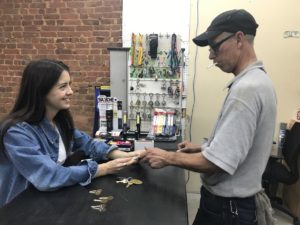
There is one thing about the Martinez’s shop that endured the passing of time, and that is their service. “If you go to Home Depot, the people there don’t necessarily have the knowledge about locks. And the locks don’t work all the time. They might just be an associate working there 9 to 5. My brother was trained and he has the experience, ” says Randy’s sister, Liza Martinez.
This sentiment is shared among the shop’s loyal customer base. “I went to get the key cut on Tuesday. They said they didn’t have the program chip or something, so they can’t do the car keys. I got it cut here for five dollars,” says Jean Pierrelouis, who worked for the MTA. He’s been living in Bed-Stuy since 1969.
“I don’t really like going to Home Depot because no one is there to help me. You are looking for someone to lend you a hand, but they’d only look at me like this when I walk in—” Berris Alstoy looks up and down suspiciously at an imaginary object, “I would come here because I want the one-on-one service.”
“As long as you are open, we will come in.” Pierrelouis says to Ada Martinez, who said she knew these people’s face, and they knew her for 20 years.
“We are very loyal to our customers. And they are to us as well, and I want to add this point, that’s the reason why we survived, and that’s the reason we are still in business,” Ada emphasizes.
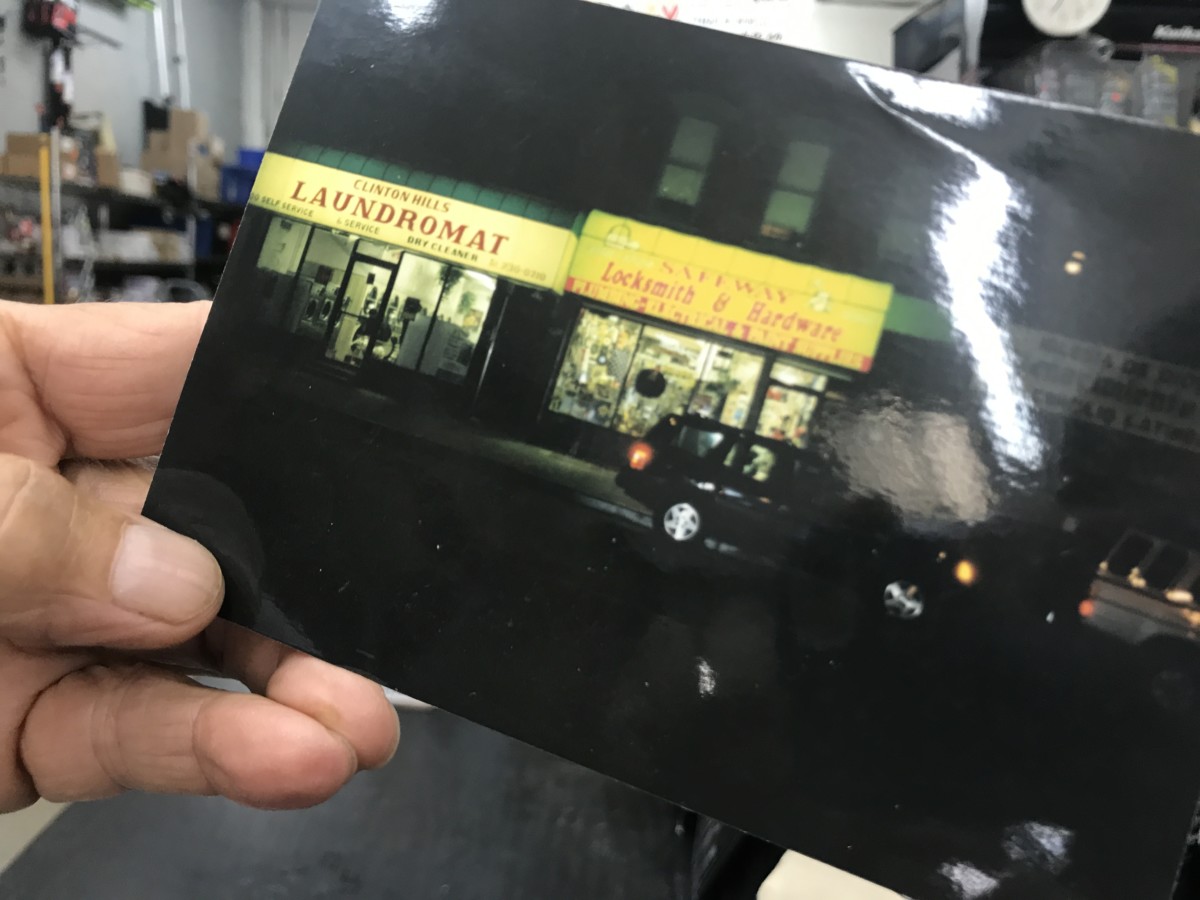
A lot of small businesses have hit a rough patch in the past decade. According to DNAinfo, seven area small businesses have closed down in 2014. The list includes Head Hunter Barbershop on Bedford Avenue, which was in business for nearly 70 years but was forced to shut down due to the rising rent. Displacement caused by gentrification seems to be a common reason for those closures. Terea Shaffer, who used to operate a coffeehouse that was “the first to serve loose leaf tea in the neighborhood in 2006” on Fulton Street off Bedford Avenue with her husband, said that the shop no longer exists because they were told that the landlord of the coffeeshop lost the building in February 2017.
In contrast, The Martinez’s locksmith shop is a long time survivor on Bedford Avenue. Randy Martinez said his parents purchased the building from the government in 1998, because “no one wanted to live in Bed-Stuy during that time.” The survival of the business, however, cannot just be attributed to luck. Gentrification brought in competitions but also traffic, and the Martinez family were conscious and prudent of the changes happening, and chose to work with the changes and the new populations in the neighborhood. They renovated the hardware shop but insisted on offering client-based services. “Jewish people came in and buy whole rows of properties,” said Randy Martinez upon our first meeting. These people and the real estate companies that are building condos turned out to be the people that make up the majority of Kings Locksmiths’ customers.
“Next step for Randy would be to get a business loan and expand the shop. Add some doors with locks people can come in and play with.” Rudy Martinez says, “That’s what he’s going to do.”
EDITOR’S NOTE: David’s first name has been changed, per his request.

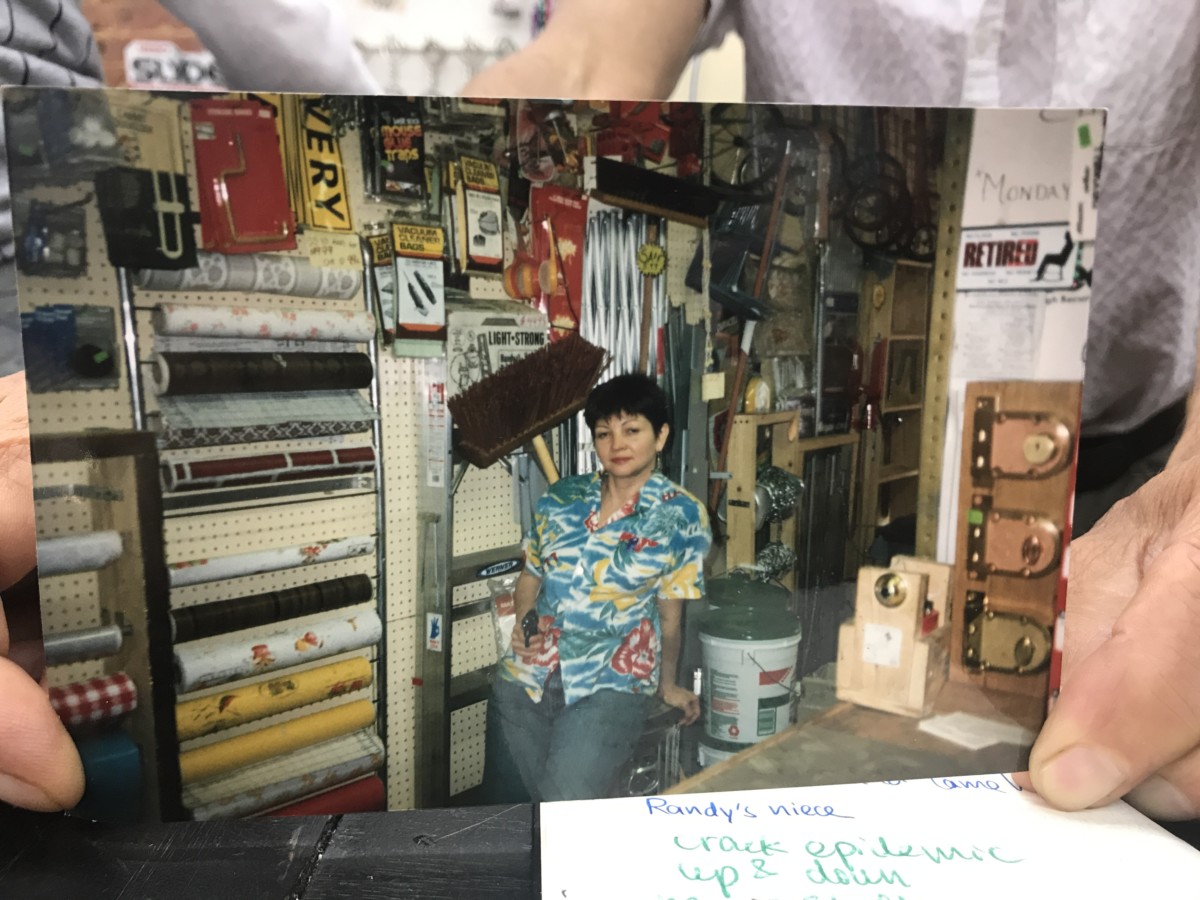
Leave a Reply